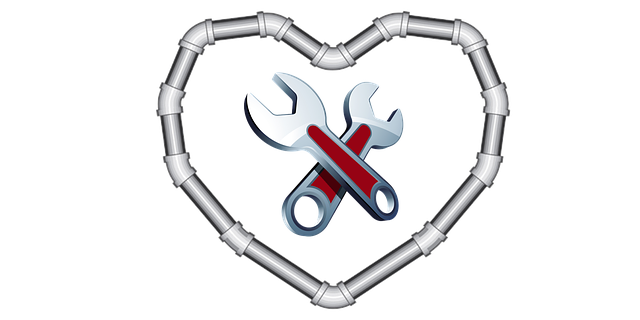A garbage disposal's efficiency relies on understanding its motor, flywheel, and blades. To keep these components functioning well, it's crucial to run the disposal with water during operation, which helps maintain blade sharpness and prevent leaks. Regular cleaning and inspection can thwart common malfunctions. If issues arise, professional plumbers are adept at diagnosing problems, performing repairs, or replacing parts, ensuring your garbage disposal handles kitchen waste safely and effectively. Maintaining your disposal through consistent use and diligent care not only extends its lifespan but also helps maintain a hygienic kitchen environment. Common issues with garbage disposals include clogs from food debris like fruit peels and eggshells, motors that hum without turning due to jams or lack of lubrication, leaks from damaged flanges or seals, and noisy operation indicating worn parts. To prevent these problems, use vinegar and baking soda for cleaning, always run cold water while using the disposal, and dispose of waste properly. When facing any issues, it's advisable to hire a licensed plumber to handle diagnoses and repairs skillfully, minimizing the need for future maintenance on your garbage disposal.
When faced with a malfunctioning garbage disposal, the quest for restored smooth operation begins. This comprehensive guide empowers homeowners with essential knowledge and practical steps to troubleshoot and repair their disposals, ensuring efficient waste handling without the need for frequent plumber interventions. From understanding your unit’s mechanism to identifying common issues, this article covers it all, including maintenance tips, DIY sharpening of blades, and signs that signal a replacement may be due. Whether you’re dealing with a jam or seeking to prevent future complications, these insights will keep your disposal in top condition.
- Understanding Your Garbage Disposal's Mechanism
- Common Issues with Garbage Disposals and Their Causes
Understanding Your Garbage Disposal's Mechanism

When confronted with a malfunctioning garbage disposal, it’s crucial to grasp how its components work in tandem to dispose of kitchen waste efficiently. At the heart of a garbage disposal lies its mechanism, which typically includes a flywheel, blades, and an electric motor. The motor drives the flywheel, which then activates the blades positioned around its circumference. As you pour water into the sink and switch on the disposal, the flowing water both lubricates the system and flushes the ground waste out of the unit and through the plumbing. To ensure proper operation, it’s important to run your disposal regularly with ample water, even when not in use. This helps maintain the sharpness of the blades and keeps the seals supple, preventing leaks and extending the life of your garbage disposal. If you encounter issues, a professional plumber can provide valuable assistance, from diagnosing the problem to performing necessary repairs or replacements. Understanding the intricacies of your garbage disposal’s mechanism allows for more effective troubleshooting, ensuring that your kitchen waste is handled safely and efficiently. Regular maintenance, such as cleaning the blades and inspecting the seals, can prevent many common issues, thereby keeping your disposal in optimal working condition.
Common Issues with Garbage Disposals and Their Causes

When it comes to common issues with garbage disposals, homeowners frequently encounter a variety of problems that can disrupt their smooth operation. One prevalent issue is a clogged disposal, often caused by food waste like fruit peels, eggshells, or grease, which can accumulate and obstruct the blades and impellers, preventing effective grinding and waste disposal. Another frequent problem is a disposal that hums but won’t turn, typically due to jammed objects or a lack of proper lubrication. This issue can be resolved by resetting the disposal, ensuring the circuit breaker has not tripped, and verifying that no foreign objects are lodged in the unit. A consistently leaking garbage disposal can be indicative of a variety of internal issues, such as a damaged flange, a loose or broken seal, or improperly aligned blades. It’s advisable to identify the source of the leak and make necessary repairs or replacements to restore functionality and prevent water damage. Homeowners may encounter a disposal that makes unusual noises, which can signal worn-out components or dysfunctional parts, necessitating inspection and maintenance by a professional plumber to avoid further damage. Regular maintenance, including cleaning the disposal with a mixture of vinegar and baking soda, running cold water while operating it, and properly disposing of waste, can help prevent many issues from arising in the first place. When issues do occur, consulting a licensed plumber is often the best course of action to ensure safe and effective repairs that will restore the smooth operation of your garbage disposal unit.
When encountering issues with your garbage disposal, a plumber’s expertise can be invaluable for restoring its efficient operation. By comprehending the intricate mechanism of your unit and identifying common malfunctions, proactive maintenance becomes straightforward. Homeowners can address many problems independently, ensuring a smoothly functioning system. Should complications arise, professional assistance is readily available to provide effective solutions. With the right knowledge and help, your garbage disposal will return to its intended purpose, disposing of waste effortlessly.
